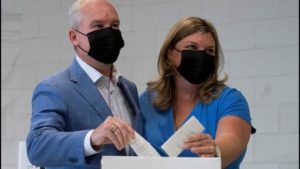
Canadians started voting on Monday in the country’s 44th elections, following a 36-day campaign. Among the early voters was Conservative Party leader Erin O’Toole, who voted at a polling station in the town of Bowmanville in Ontario. However, it’s the person he’s attempting to unseat, incumbent Prime Minister Justin Trudeau who has the definite edge in the contest.
The elections were called on August 15 and Justin Trudeau’s objective was to secure a majority to govern the country. He may well return to the helm in Ottawa but the likelihood of a minority government is far higher, though, if his ruling Liberal Party performs optimally across close contests, a majority cannot be considered impossible.
As per the latest data from the tracking website 338 Canada, the Liberals had 31.9% vote share translating to 148 seats, while their principal rival Conservatives had 31.4% support equal to 125 seats. The outlet CBC’s poll tracker gives the ruling party a 57% chance of forming a minority government but just 17% for a majority.
The majority mark in the House of Commons is 170 and the ruling party captured 157 seats in 2019 with the Tories at 121.
The campaign has been described by many analysts as the most divisive in recent times, witnessing noisy protests at Justin Trudeau’s rallies over vaccine mandates, including one in Ontario where gravel was tossed at him.
The Covid-19 pandemic may well be the main factor as people vote, though the economy, with inflation at a three-decade high and issues like climate change and indigenous rights will also count.
Approximately, 6.3 million Canadians have voted prior to Monday, at advance polls that spanned four days and through mail-in ballots.
The contest is extremely tight and the suspense may well stretch on for a couple more days. While results are normally announced the same night of the elections, Elections Canada has said it will only start counting mail-in ballots on Tuesday morning after verifying those using that option had not voted in person as well. With over a million such votes to be tallied, results for seats with narrow margins may remain in doubt.
The ruling Liberal Party under Justin Trudeau is pitching its management of the Covid-19 pandemic and leveraging the wedge issue of vaccine passports against the Conservatives, as its leader Erin O’Toole has opposed imposition of mandatory vaccination. That single issue has bolstered Justin Trudeau’s campaign, and indications on the eve of the election are that he may even have an outside chance at capturing the majority he craved for while precipitating snap elections on August 15.
With Western Canada, particularly the province of Alberta, suffering from the fourth wave of the coronavirus, Justin Trudeau has, with some success, linked that to the failure of the provincial governments which are all run by right-of-centre parties and their ties to Erin O’Toole. He has described the fourth wave as one of the unvaccinated, criticising Erin O’Toole for indulging anti-vaxxers. Canada, he said, at a campaign event on Sunday, was ‘at a crossroads, at a moment where we have to make a really important choice’. That single factor may have given Justin Trudeau’s party enough impetus for a majority, which may have been unthinkable a week back.
Erin O’Toole, meanwhile, is also making this a referendum, not just on Trudeau but also on his ‘selfish’ call for elections in the midst of the fourth wave, an issue that continues to resonate with voters. ‘Now is the time for Canadians to make a choice. We can choose to settle for second-best – for a party that hardly tries and barely delivers. Or we can choose to believe in a brighter, better, more united future,’ he said.
Both leaders spent some of the last day campaigning in Canada’s most populous province Ontario, which could prove crucial in determining the shape of the next Government.
Turnout amid voter malaise could be the X-factor in the final outcome. The agency Ipsos Canada forecast a ‘photo finish’ to the contest. Its CEO Darrell Bricker tweeted, ‘Here’s what I’m seeing. It’s very close. Tory vote a bit more certain, energetic than LPC vote but incumbents have built in advantages. Do they cancel out? Hard to gauge.’
It’s really that uncertain, but the advantage definitely lies with Justin Trudeau.




 Driving Naari Programme launched in Chandigarh
Driving Naari Programme launched in Chandigarh






























